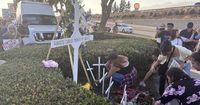On the morning of August 14, 2025, the usual bustle at the Home Depot on Mountain Avenue in Monrovia, California, was shattered by the sudden arrival of Immigration and Customs Enforcement (ICE) agents. According to Monrovia City Manager Dylan Feik, the unannounced raid sent shockwaves through the store and its parking lot, a familiar gathering spot for day laborers seeking work. What happened next would spark outrage, sorrow, and a renewed debate over immigration enforcement in Southern California.
As ICE agents conducted what they described as a “targeted enforcement operation,” one man—identified by acquaintances and advocacy groups as Carlos Roberto Montoya, a 52-year-old father from Guatemala—panicked and fled the scene. According to the National Day Laborer Organizing Network and confirmed by NBC News, Montoya sprinted across Evergreen Avenue, then made a desperate dash onto the eastbound lanes of the Foothill (210) Freeway near Myrtle Avenue. Tragically, he was struck by a Ford Expedition SUV traveling at 50 to 60 mph. California Highway Patrol (CHP) officials reported that Montoya suffered major injuries and was pronounced dead after being transported to a hospital.
The incident quickly became a flashpoint in the ongoing debate over federal immigration enforcement. Protesters gathered at the scene on Thursday, voicing their outrage and grief. The following evening, a vigil organized by the National Day Laborer Organizing Network drew dozens to the Home Depot parking lot. Rev. Francisco Garcia, co-chair of the Episcopal Diocese of Los Angeles’ Sacred Resistance ministry, addressed the crowd, saying, “We’re here to just to lift up his humanity, to say his name … and to say that this cannot happen anymore,” as quoted by CNN.
Montoya’s story is, in many ways, emblematic of the precarious existence faced by many undocumented immigrants. Acquaintances told ABC7 that he was working to support his family in Guatemala, sending money home in hopes of giving them a better life. The Guatemalan consulate in Los Angeles issued a statement expressing regret over the tragedy and confirmed that it was in contact with Montoya’s family, providing needed assistance.
State Assemblymember John Harabedian, who represents Monrovia, confirmed that 10 individuals were detained during the ICE operation. In a statement shared on his Instagram story, Harabedian wrote, “Raids like this do not make our streets safer — they terrorize families, instill fear, and put lives at risk.” The sentiment was echoed by many at the rally and vigil, where the prevailing mood was one of anger and frustration toward ongoing immigration enforcement actions in Los Angeles County.
Senator Sasha Renée Pérez, D-Pasadena, whose district includes Monrovia, issued a sharply worded statement on August 14. “President Trump’s terror campaign has taken another life,” she said, offering condolences to Montoya’s family. “There is such incredible fear in our immigrant communities, so much so that people will run into freeway traffic out of fear when all they want is a chance to support their family and seek the American Dream.” Pérez went further, accusing the Trump administration of violating a federal court order by continuing “deadly roving immigration raids within the area of the U.S. District Court’s Central District of California that includes Los Angeles County.” She referenced a federal judge’s ruling that such raids amounted to illegal racial profiling and noted that a temporary restraining order was in place. “How many more brown-skinned people have to die before the president will obey the law?” Pérez asked, calling for bipartisan comprehensive immigration reform as the only real solution.
As the debate raged, the U.S. Department of Homeland Security defended ICE’s actions. Homeland Security Secretary Kristi Noem, speaking on Fox News Channel, stated, “Every single one of our ICE and Border Patrol operations is built on information, on investigative work. We’re focusing on the worst of the worst.” Noem denied that ICE actions were random or indiscriminate, emphasizing that operations were based on intelligence about possible illegal criminal activity in specific locations.
ICE itself, in a statement provided to CNN, insisted that Montoya “was not being pursued by any DHS law enforcement” at the time he ran onto the freeway. The agency said it was unaware of the incident until it was notified by California Highway Patrol hours after their operation had concluded. The company at the center of the incident, Home Depot, also distanced itself from the raid. Beth Marlowe, a spokesperson for Home Depot, told NBC News that the company is not notified in advance about ICE activities and does not participate in enforcement operations at its stores.
Despite these statements, the sense of fear and uncertainty among day laborers remains palpable. Immigration authorities have focused many of their recent operations on Home Depot stores and other home improvement retailers, where day laborers often congregate. The National Day Laborer Organizing Network described the ICE actions as part of “an ongoing wave of violent, chaotic kidnappings and assaults” targeting vulnerable workers in Southern California.
The California Highway Patrol, together with the Monrovia Police Department, is investigating the precise circumstances of the incident and the connection, if any, between the ICE operation and Montoya’s fatal flight. As of August 16, 2025, CHP officials had not reached a conclusion about whether the enforcement action directly led to the tragedy. Officer J. Rosas is leading the investigation, and authorities have encouraged anyone with further information to come forward.
The incident has become a touchstone for broader concerns about the impact of immigration enforcement on communities. Advocates argue that aggressive tactics create an atmosphere of terror, driving people to make life-or-death decisions in moments of panic. Critics of the current approach, including elected officials like Pérez and Harabedian, insist that such enforcement does little to improve public safety and instead tears families apart and endangers lives. On the other hand, federal officials maintain that ICE’s work is targeted and necessary for national security, focusing on individuals with criminal backgrounds.
As the community mourns Carlos Roberto Montoya, the debate over immigration enforcement in California shows no signs of abating. The calls for reform are growing louder, even as federal authorities stand by their methods. For now, the parking lot of the Monrovia Home Depot stands as a somber reminder of the human cost at the heart of these policies—a place where fear, hope, and tragedy collided on a summer morning.

